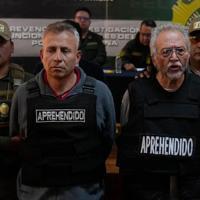La Paz
Gen. Juan Mario Paulsen Sandi, left, and Anibal Aguilar Gomez, arrested for their alleged involvement in what President Luis Arce called an attempted coup, are presented to reporters, Thursday, June 27, 2024, in La Paz, Bolivia.
Bolivian authorities on Thursday announced the arrest of 17 people, taking handcuffed detainees before media and threatening to impose sanctions on the country following a failed coup that has deepened political turmoil in a country plunged into a deep economic crisis.
Tensions have risen in the Andean country in recent weeks over rising prices, dollar and fuel shortages and a feud between President Luis Arce and powerful former president Evo Morales ahead of 2025 elections.
Appearing in public for the first time since announcing the end of the failed coup attempt on Wednesday night, Arce denied conspiring with army commander Juan Jose Zuniga, who sent troops and tanks into the center of the capital, La Paz, to break down the doors of the presidential palace.
“Can you order or plan a coup against yourself?” Arce told reporters, arguing that Zuniga was simply following orders and that Arce wanted to provoke the crackdown to boost his own popularity.
Riot police kept a close watch on government buildings on Thursday, a day after Zuniga, surrounded by soldiers and tanks outside the presidential palace, said “the military is going to rebuild our democracy, make it a real democracy, not one where the same few people rule for 30 or 40 years.”
Shortly afterwards, soldiers and tanks withdrew from historic Plaza Murillo and local television stations aired footage of Zúñiga's arrest.
Bolivian Navy Commander Juan Arnes Salvador was also arrested. Prosecutors say the pair face up to 20 years in prison on charges of terrorism and armed insurrection.
Protecting Democracy
Interior Minister Eduardo del Castillo said a total of 17 people, including active and retired military personnel and civilians, had been arrested in connection with the attempted coup, and the search for other suspects was ongoing.
The government broadcast a conversation between President Arce and President Zuniga at the entrance to the presidential palace, surrounded by military personnel, in which President Arce ordered military commanders to withdraw their troops to the barracks.
President Zuniga responded with a resounding “no,” but left the presidential palace a few minutes later.
“Whatever the cost, we will defend democracy and the will of the Bolivian people!” the 60-year-old President Arce wrote on social media platform X. He then swore in new military leaders.
But in an unusual turn of events, Zúñiga told reporters that President Arce had ordered a planned uprising to project his strength and launch a crackdown to “boost his popularity.”
“That is completely false,” said Maria Nela Prada, a close aide to the president.
Former centrist President Carlos Mesa (2003-2005) wrote in X newspaper that the military deployment “resembles a farce.”
Brazilian President Luiz Inacio Lula da Silva announced on Thursday that he would soon visit his “friend” President Arce to support him in the wake of the unrest. In an interview with Itatiaia radio, Lula said he would visit the Bolivian city of Santa Cruz de la Sierra to “empower President Luis Arce and strengthen democracy.”
Russia's Foreign Ministry on Thursday “strongly” condemned the attempted military coup and warned against “destructive foreign interference” in the South American country.
UN Secretary-General Antonio Guterres had earlier expressed concern about the attempted coup, saying he would “welcome a peaceful resolution to the situation,” his spokesman Stephane Dujarric said.
Condemnation of the attempted coup came from Madrid, Washington and across Latin America.
Political tug-of-war
Bolivia, which has a long history of military coups, has been hit by an economic crisis in recent weeks due to a decline in gas production, its main source of foreign currency until 2023.
The country has been forced to cut fuel imports and is running out of dollars, sparking protests by powerful unions of merchants and freight transporters.
Gustavo Flores Macias, a political science professor at Cornell University in New York, told AFP the attempted coup was “a sign of deep and widespread discontent in the country”.
At this point, “we need to carefully assess how widespread the discontent is within the military,” he said, adding that Arce's government was facing a “critical moment of weakening.”
Bolivia has been deeply polarised by years of political instability, with internal conflict within the ruling Socialist Movement (MAS) party between supporters of President Arce and former leader Morales.



